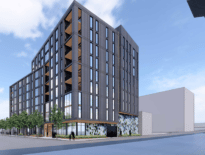
Natural gas-powered HVAC systems are in Boston officials’ and designers’ crosshairs as they look to slash the commercial real estate sector’s carbon emissions.
Boston took a major step Wednesday toward seeking state permission for a fossil fuel ban in the local building sector when a home rule petition won City Council approval.
Councilors voted 9-3 in favor of the measure, unveiled last month by Mayor Michelle Wu, that aims to transition new construction and major renovations in New England’s largest city to all-electric heat and other forms of fossil fuel-free infrastructure. The home rule petition exempts lab buildings. The three dissenting votes were Councilors Frank Baker, Michael Flaherty and Erin Murphy, according to the Boston Herald.
Wu still needs to sign the petition to send it to Beacon Hill, a city spokesperson said. That is likely a formality after she announced plans to pursue the change in August. After that, the next steps for Boston are far murkier, intertwined with state regulatory review and decision-making yet to unfold in other Massachusetts cities and towns.
A new clean energy law Gov. Charlie Baker signed last month creates a pilot program allowing 10 municipalities to limit the use of fossil fuels in their local building sectors, and 10 cities and towns already secured spots by filing home rule petitions before the measure got signed into law.
Boston could wind up in limbo awaiting state authorization to pursue its own fossil fuel restrictions separate from the pilot program, a change to the program’s cap of 10 municipalities, or for a spot in the program to open up if any city or town further ahead in line drops out.
Who’s In? Who’s Out?
Three of the communities already in line to join the program – Arlington, Newton and West Tisbury – are at risk of failing to qualify for the program because of their low affordable housing stocks, a prerequisite that Boston would meet based on available data. The Somerville City Council approved its own home rule petition to get onto the waitlist pool late last month, according to meeting minutes
Arlington has far from enough affordable housing to meet the pilot’s requirements but Town Manager Sandy Pooler told the News Service he intends to pursue a multi-family by-right zoning change at Town Meeting, which would clear a path to taking part. Newton officials wrote in an August memo that they are close to hitting the pilot program’s affordable housing requirements and called it “possible” to reach them “sometime in the next six months.”
West Tisbury officials openly acknowledge they do not expect to qualify for the pilot program. This could give the Department of Energy Resources – which is managed currently by Baker – gains full authority to pick a replacement participant from the full universe of municipalities who want to be in the mix, regardless of whether they occupy the 11th place in line or the 51st.
“If two cities submit home rule bills in successive weeks, let’s say Boston and Somerville, both are to be considered if they have at least 10 percent affordable housing and have filed the home rule bill, but neither is assured a place,” said state Sen. Michael Barrett, who co-chairs the Telecommunications, Utilities and Energy Committee and was the gas ban’s lead author. “DOER gets to choose.”
A DOER spokesperson who would communicate only on background said officials there expect to craft a formal process to implement the effort, which would include a schedule for cities and towns to apply, the spokesperson said.
Boston ‘Putting Money Where Our Mouth Is’
Boston Chief of Environment, Energy and Open Space Rev. Mariama White-Hammond told the News Service earlier this week that the effort is “putting our money where our mouth is and really pushing folks to decarbonize as aggressively as possible.”
“There comes a point at which you have to say no more to ways of doing things that you know are not sustainable for the long run,” White-Hammond said in an interview. “Why would we continue to build buildings now that we know are going to lock in carbon dependency and fossil fuel dependency for 50, 70 more years if we’re saying we’re going to be net-zero in 2050?”
In Boston, about 70 percent of greenhouse gas emissions come from the buildings sector, White-Hammond’s office said, making it by far the largest individual contributor as both the city and Massachusetts as a whole move toward a target of net-zero emissions by 2050. Slashing carbon emissions from buildings is “easiest,” White-Hammond said, when they are constructed that way in the first place rather than modified or retrofitted later in their lifespans.
Several other major American cities including New York, Los Angeles and Seattle have kicked off their own efforts to require buildings to deploy some combination of electric-powered heat, appliances and hot water rather than natural gas or other systems powered by fossil fuels.
Developers Fret Over Costs
Meanwhile, Boston’s effort has drawn the ire of developers. Greater Boston Real Estate Board CEO Greg Vasil said his organization “firmly agrees with and supports” Boston’s efforts to combat climate change, but charged that such a move would increase construction costs too far at a time when housing developers are facing ever-greater costs for materials and money to build new apartments and condominiums.
“Banning fossil fuels in building construction now, at this time and present market, will lead to a serious increase in housing costs, when global challenges like inflation and supply chain shortages are already adding to housing costs,” Vasil said in a statement. “As a result, addressing the present housing crisis will be even more difficult for Boston. Additionally, transitioning away from fossil fuels now will also increase costs around business construction – an especially troubling outcome as employers are still struggling to attract workers back to the office in this post-COVID working environment.”
DOER research published in February shows that a hypothetical six-unit multifamily building designed from the start as an all-electric structure was both cheaper to build, thanks to state equipment subsidies, and operate than one whose hot water heaters, stoves and other systems were fueled by natural gas. Supporters of the gas ban pilot have pointed to this research in saying developers’ concerns are overblown, but real estate groups have countered with doubts that the research can be extrapolated to large 100- or 200-unit buildings.






